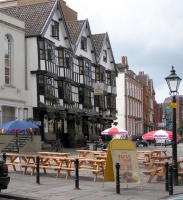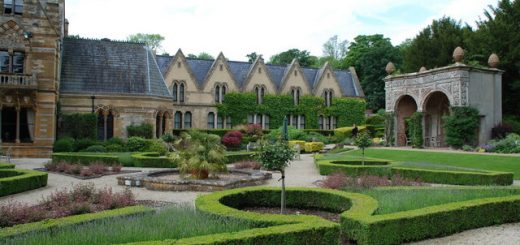Althorp
Built by Robert Spencer, 2nd Earl of Sunderland (Born 5 September 1641 – Died 28 September 1702) in 1688, the Grade I listed Althorp House and estate is the ancestral home of the Spencer family. Prior to her marriage to her marriage to Prince Charles, Althorp was the home of Diana Princess of Wales (Born 1 July 1961 – Died 31 August 1997) and it here on the estate that she is buried.
In ‘The Haunted Homes and Family Traditions of Great Britain’ (1897), John Ingram gives the following description of a haunt like experience at Althorp in the 19th century, featuring (possibly) Henry Drury (Born 1812 – Died 1863) (Archdeacon of Wiltshire, Chaplain to the Speaker of the House of Commons) and Sarah Lyttelton, Baroness Lyttelton (née Spencer) (Born 29 July 1787 – Died 1870) daughter of Sir George Spencer, 2nd Earl Spencer (Born 1758 – Ded 1834).
![Andrew Walker (walker44) [GFDL (http://www.gnu.org/copyleft/fdl.html), CC-BY-SA-3.0 (http://creativecommons.org/licenses/by-sa/3.0/) or CC BY-SA 2.5 (https://creativecommons.org/licenses/by-sa/2.5)], from Wikimedia Commons](http://www.mysteriousbritain.co.uk/wp/wp-content/uploads/2018/12/1280px-Althorp_House-300x200.jpg) Althorp, the magnificent Northamptonshire seat of Earl Spencer, has been the residence of its proprietors from the “olden time,” as Baker says, in his history of the county. The simplicity of its exterior is fully compensated by the attractions within: its magnificent library is one of the wonders of England, and its superb collection of paintings another. Since Althorp has been in possession of the Spencers it has been honoured by two royal visits; the first was paid by the Queen and the elder son of James the First, and the second by William the Third, in 1695, when a large gathering of the nobility and gentry of the county took place in honour of the event.
Althorp, the magnificent Northamptonshire seat of Earl Spencer, has been the residence of its proprietors from the “olden time,” as Baker says, in his history of the county. The simplicity of its exterior is fully compensated by the attractions within: its magnificent library is one of the wonders of England, and its superb collection of paintings another. Since Althorp has been in possession of the Spencers it has been honoured by two royal visits; the first was paid by the Queen and the elder son of James the First, and the second by William the Third, in 1695, when a large gathering of the nobility and gentry of the county took place in honour of the event.
That a residence of the antiquity and importance of Althorp should have a ghost is nothing unusual; if, indeed, it had several it need not be a matter of wonder, as such things go. The apparition which is connected with Earl Spencer’s palatial dwelling, however, is not of the character one generally finds connected with places of that rank, nor are we aware that it habitually haunts the place, but it is so remarkable an instance of ghost-seeing, related to us on such good authority, that is well worth record here.
Mr.(afterwards Archdeacon) Drury was invited by Lord and Lady Lyttleton to accompany them on a visit to Earl Spencer, the lady’s father, then at Althorp. After dinner Mr. Drury and Lord Lyttleton amused themselves with billiards, and continued so late at their game that at last one of the servants went to them to request that when they went to bed they would extinguish the lights themselves. He asked them to be very careful in doing so, as Lord Spencer was always uneasy about fire. Looking at their watches, they were amazed to find that it was past two, and both of them went to bed without further delay.
Mr. Drury was awakened from his slumbers by the reflection of a light falling on his face; opening his eyes, he beheld at the foot of his bed a man dressed as a stable-man, in striped shirt and flat cap, and carrying a lantern with the bull’s-eye turned full upon the disturbed sleeper.
“What do you want, my man? Is the house on fire?” exclaimed Mr. Drury; but he received no reply, his visitor remaining silent and immovable.
“What do you mean by coming into a gentleman’s room in the middle of the night? What business have you here?” he demanded, but, unable to elicit any response, became more imperious in his remarks, bidding the fellow be gone as an impudent scoundrel, whose conduct should be reported to his master.
The figure then slowly lowered the lantern and passed into the dressing-room, from which there was no other means of exit than that by which he had entered.
“You won’t be able to get out that way,” Mr. Drury called out, and then, overcome by drowsiness, he dropped off to sleep again, without even waiting to see the result.
Next morning Mr. Drury remarked to Lady Lyttleton that it was a very odd thing, but a stable-man had walked into his room in the middle of the night, and would not go away for some long time, adding, “I suppose the man was drunk, but he did not look so”; and he then proceeded to describe his dress and general appearance.
Lady Lyttleton turned pale. “You have described,” she said, “my father’s favourite groom, who died a fortnight ago, and whose duty it was to go round the house after everyone had gone to bed, to see that the lights were extinguished, and with strict orders to enter any room where one was seen burning.”
Mr. Dairy’s feelings may be imagined, and that he never slept in that room again alone will readily be assumed; but whether he, or anyone else at Althorp, ever beheld the apparition of the dead groom again is another matter, about which we are unable to furnish any information.




Recent Comments